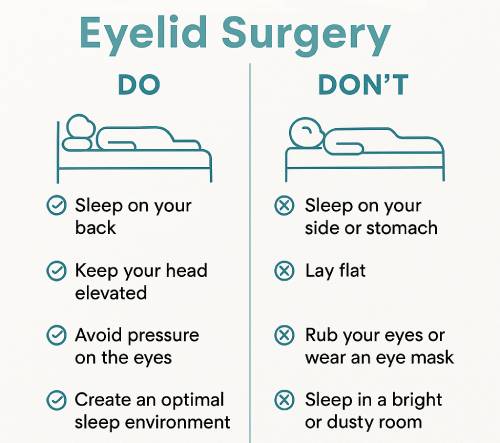Eyelid surgery is a cosmetic procedure designed to improve the appearance of the eyes. It is highly popular due to its functional and aesthetic benefits. In some cases, the eyelid can impact vision, making daily life difficult. The cosmetic benefits offer a more refreshed and youthful appearance. Long-lasting upper eyelid surgery involves the removal of excess skin and muscle around the eyes. The muscles are tightened, and excess fat is either removed or repositioned to leave patients looking years younger. The recovery process is a significant factor in determining your results. Below, you will find how to sleep after eyelid surgery and other tips related to your post-surgery recovery process.
How to Sleep After Eyelid Surgery

Eyelid surgery can provide you with a rejuvenated appearance. One of the key factors in your recovery process is the quality of your sleep at night. Consider the following tips for sleeping after surgery.
Sleep Position
It is important to sleep on your back after surgery to reduce the likelihood of undue pressure on your eyes while you rest. Specifically, sleeping on your side or stomach can increase pressure on the eyelids, leading to more swelling and delayed healing. Sleeping on your stomach or sides can also impact the sutures. Any impact on the sutures can prolong the healing process and increase the risk of infection. Sleeping on your back ensures that you do not have direct contact with the pillowcase. Contact with your bedding after surgery can increase the risk of infection.
Elevation
Keeping your head elevated when you sleep is essential for healing. Sleeping on your back with your head elevated reduces swelling and bruising. Proper fluid drainage occurs when you are in an elevated position. This, in turn, reduces the amount of pressure on the eyes.
Try to maintain an elevation of around 30 to 45 degrees for a couple of weeks after surgery. Use extra pillows or a wedge pillow to keep your head elevated and supported. Doing so can promote faster healing, allowing you to return to your routine as soon as possible.
Avoid Contact With The Eyes
Sleeping on your back and keeping your head elevated are important after eyelid surgery. You should also avoid contact with your eyes during sleep. Rubbing or pressure on the eyes can have serious consequences. It can impact your recovery, disrupt the sutures, and increase the risk of infection. Avoid wearing eye masks or anything else that can potentially come into contact with your eyes at night. These can negatively impact your sutures and result in suboptimal outcomes.
Optimal Sleep Environment
Creating a sleep environment that promotes rest and supports recovery is essential. Sleep in a cool, dark room for optimal sleep. A good night’s sleep after surgery promotes tissue repair. Keep the area where you rest clean. Allergens, pet dander, and other irritants can cause eye irritation or increased tearing, which, in turn, can harm the surgical sites and make healing more difficult. Additionally, keep the bedding clean and change your pillowcases daily to reduce the risk of infection and promote healing.
Is Eyelid Surgery Right for Me?
Eyelid surgery can address both functional and cosmetic concerns. Consider the following to determine if eyelid surgery is right for you.
Cosmetic Reasons
Natural aging and poor lifestyle habits impact your appearance. Your eyes are often one of the first places to show the signs of aging. If you have fine lines, excess fat, or skin sagging around your upper eyelids, surgery can address these concerns. Eyelid surgery addresses the signs of aging around the eyes that make you look tired, angry, and much older than you are. Upper eyelid surgery enhances the appearance of the eyes, revealing a more youthful and refreshed look. Patients often report an increase in self-confidence due to the results.
Functional Concerns
Eyelid surgery also addresses functional concerns caused by sagging eyelids. Excess upper eyelid skin can droop over the eyes, impacting your vision and making daily activities, such as driving and reading, very difficult. These issues can impact both your personal and professional endeavors, ultimately reducing your overall quality of life. Eyelid surgery can address functional issues and make life safer and more enjoyable.
Eyelid Surgery Consultation
The first step in moving forward with eyelid surgery involves scheduling a consultation. A skilled and experienced surgeon can assess if you are a good candidate for the procedure. Candidates should be in good overall health, refrain from smoking, and have realistic expectations. Share your aesthetic and functional goals with the surgeon at your consultation. This helps them create a customized treatment plan based on your unique needs.
Long-Lasting Eyelid Surgery
If you are unhappy with the appearance of your eyes, contact the team at Jeffrey Joseph Ophthalmic Plastic Surgery today to schedule a consultation.
